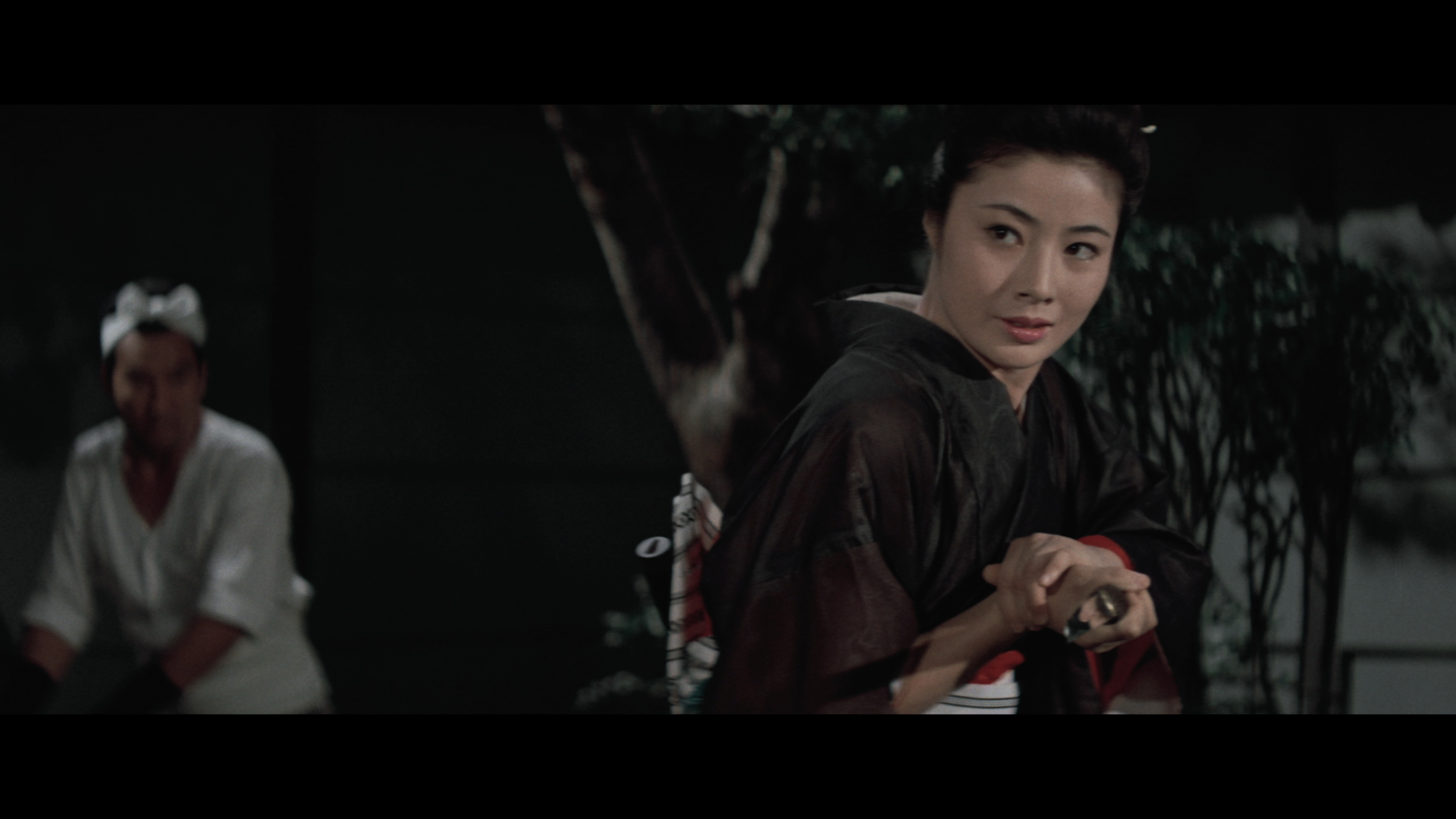 Photo courtesy of Film Movement. © Toei.
Photo courtesy of Film Movement. © Toei.
Source: Film Movement press release
Official Site: https://www.filmmovement.com/warm-water-under-a-red-bridge
Special Thanks to Michael Krause
Produced during the heyday of ninkyo eiga (chivalrous yakuza films), the seminal Red Peony Gambler series has had a lasting influence on cult cinema. The illustrious Junko Fuji stars as the beautiful and badass Oryu, the eponymous and benevolent female gambler who uses her incredible might for right.
This November, Film Movement delivers the celebrated trio of Japanese action classics newly restored from original film elements.
 Photo courtesy of Film Movement. © Toei
Photo courtesy of Film Movement. © Toei
RED PEONY GAMBLER (牡丹博徒, Hibotan Bakuto)
Wandering female gambler Oryu the Red Peony (Junko Fuji), so known for the tattoo on her shoulder, rambles into town searching for her father’s killer with a wallet left at the crime scene as her only clue. At a card game she meets a kindred spirit, the noble and handsome yakuza Katagiri (Ken Takakura), when they team up to foil a cheating player. As their paths continue to cross she befriends a gang boss and other sundry denizens of the underworld who all join forces to guide her on a blood-soaked quest for vengeance.
With its fantastic tropes and charismatic stars this inaugural entry in the Red Peony Gambler series proved an influential watershed of the “chivalrous gangster” genre and was so popular that it spawned multiple sequels.
(Director Kosaku Yamashita, 1968, 98 minutes, Japanese with English Subtitles)
 Photo courtesy of Film Movement. © Toei
Photo courtesy of Film Movement. © Toei
RED PEONY GAMBLER 2: GAMBLER’S OBLIGATION (緋牡丹博徒 一宿一飯, Hibotan Bakuto isshukuippan)
The second installment of the influential Red Peony Gambler series finds the titular heroine Oryu taken under the arm of the benevolent gang boss of a silk farming town. Soon ruthless loan sharks encroach on the business determined to enslave and exploit the workers. When their treachery leads to murder, it is Oryu’s sworn duty to avenge her benefactor and exact justice. Meanwhile, she must also deal with a nefarious card-hustling couple who have infiltrated the local gambling scene as well as moral conflicts between her allies.
Noribumi (aka Norifumi) Suzuki, the screenwriter of the first film and a genre filmmaking stalwart in his own right, takes over the directorial reins with his patented style of taut action and drama inflected with ribald humor. Yakuza genre icons Koji Tsuruta and Bunta Sugawara guest star opposite the series’ incomparable lead, Junko Fuji.
(Director Norifumi Suzuki, 1968, 95 minutes, Japanese with English Subtitles)
 Photo courtesy of Film Movement. © Toei
Photo courtesy of Film Movement. © Toei
RED PEONY GAMBLER 3: THE FLOWER CARDS GAME (緋牡丹博徒 花札勝負, Hibotan Bakuto Hanafuda Shōbu)
Maestro of Japanese cinema Tai Kato simultaneously satiates and transcends genre tropes in his masterful direction of the celebrated third film in the Red Peony Gambler series. From its classically melodramatic opening set piece involving an oncoming train, the stage is set for a visually rich tale of good versus bad yakuza. While traveling in hopes of reestablishing her own clan, Oryu (Junko Fuji) finds herself in Nagoya, where she takes up residence with the noble Nishinomaru family just as they are preparing to host their traditional gambling competition. Naturally, their dishonest rival gang tries to usurp the event and sabotage its proceedings. It’s up to Oryu to step in on the side of righteousness. Meanwhile, she must also contend with a card shark who is impersonating her, rescue a pair of star-crossed lovers and other quotidian travails of a legendary wandering female yakuza.
Ken Takakura returns to the series as a mysterious stranger who allies with Oryu. It is arguably, "the darkest, most complex and ultimately also the best part of the series" (Nippon Cinema).
(Directed by Tai Kato, 1969, 98 minutes, Japanese with English Subtitles)
 Photo courtesy of Film Movement. © Toei.
Photo courtesy of Film Movement. © Toei.
About Film Movement
Founded in 2002, Film Movement is a North American distributor of award-winning independent and foreign films based in New York City. It has released more than 250 feature films and shorts culled from prestigious film festivals worldwide. Film Movement’s theatrical releases include American independent films, documentaries, and foreign art house titles. Its catalog includes titles by directors such as Ryusuke Hamaguchi, Lee Isaac Chung, Hirokazu Kore-eda, Maren Ade, Jessica Hausner, Andrei Konchalovsky, Andrzej Wajda, Diane Kurys, Ciro Guerra and Melanie Laurent.
In 2015, Film Movement launched its reissue label Film Movement Classics, featuring new restorations released theatrically as well as on Blu-ray and DVD, including films by such noted directors as Ang Lee, Eric Rohmer, Luchino Visconti, Stanley Kwan, Peter Greenaway, Bille August, Marleen Gorris, Takeshi Kitano, Arturo Ripstein, King Hu, Sergio Corbucci and Ettore Scola. For more information, please visit www.filmmovement.com. Visit www.filmmovementplus.com for more information about Film Movement Plus, Film Movement’s critically lauded streaming subscription service.

